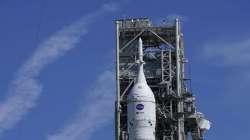NASA delays moon rocket launch due to potential hurricane
Given the forecast uncertainties, NASA decided Saturday to forgo Tuesday's planned launch attempt and instead prepare the 322-foot (98-metre) rocket for a possible return to its hangar.

NASA is skipping next week's launch attempt of its new moon rocket because of a tropical storm that's expected to become a major hurricane. It's the third delay in the past month for the lunar-orbiting test flight featuring mannequins but no astronauts, a follow-up to NASA's Apollo moon-landing programme of a half-century ago.
Hydrogen fuel leaks and other technical issues caused the previous scrubs. Currently churning in the Caribbean, Tropical Storm Ian is expected to become a hurricane by Monday and slam into Florida's Gulf coast by Thursday. The entire state, however, is in the cone showing the probable path of the storm's center — including NASA's Kennedy Space Centre.
Given the forecast uncertainties, NASA decided Saturday to forgo Tuesday's planned launch attempt and instead prepare the 322-foot (98-metre) rocket for a possible return to its hangar. Managers will decide Sunday whether to haul it off the launch pad. If the rocket remains at the pad, NASA could try for an October 2 launch attempt, the last opportunity before a two-week blackout period.
But a rollback late Sunday or early Monday likely would mean a lengthy delay for the test flight, possibly pushing it into November. The Space Launch System rocket is the most powerful ever built by NASA. Assuming its first test flight goes well, astronauts would climb aboard for the next mission in 2024, leading to a two-person moon landing in 2025.
ALSO READ | James Webb telescope captures clearest view of Neptune's rings in decades | Pics
ALSO READ | NASA fuels moon rocket in test, hit again with pesky leaks